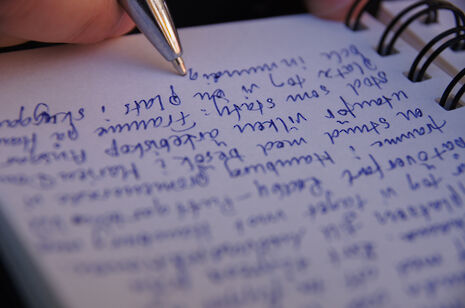Making a living from writing: living the dream?
Miriam Joy talks about her ambitions of working as a writer in the future

I don’t remember when, or why, I decided I was going to be a writer. There was definitely a time before, because I remember when my only dreams were to be a mother and an angel. A morbid aspiration, when you consider that I believed you became an angel when you died – and not exactly a win for feminism, since I had no apparent ambitions other than to have kids and then pop my clogs. Probably just as well it didn’t come up in my Newnham interview, although I can assure you I’m no longer quite that morbid (and I really don’t like children).
Since my first, horrendously awful play at the age of eight (a painfully derivative Tolkien-esque story called Escape, written in Papyrus font, that I forced my friends to act out against their will), becoming a writer has been my end goal. I spent a couple of ambitious years researching agents without even having written a novel, and then at the age of 13 I discovered National Novel Writing Month (NaNoWriMo) and got my first, terrible book on paper. I started getting terrifyingly serious about the whole writing thing.
“But writing isn’t just my passion – it’s the only career I can see myself having.”
Since then, I’ve written literally millions of words (both of fiction and blog posts), entered competitions, co-written a children’s book, and self-published three poetry collections. But I’ve made very little progress towards finding an agent for my novels, mostly because I keep losing confidence just before querying and deciding to edit them all over again. Thanks, anxiety. Now and again – usually after I’ve been rejected for something – I wonder if I’m really cut out for the writing life: the stress of deadlines, the self-discipline, the Twitter trolls and bad reviews. But I have no idea who I am if I’m not a writer, because it’s the thing around which I constructed my entire sense of identity, and I figure it’s easier to learn to deal with those issues than to figure out a new personality at the age of 21.
Nowadays, I don’t tend to tell people I want to be a writer: instead, I tell them I want to make a living from writing. Partly because I want to make sure they know I’m not harbouring romantic ideas of sitting in a coffee shop with a Moleskine notebook. Partly because I want them to realise I’ve thought about it as a career, rather than a hobby or something to do alongside a day job. And partly it’s that I already consider myself a writer. I’m just not one who makes any money from it.
As a teenager, I was aiming to get published before or when I first went to uni, so that my poor newbie writer years would coincide with being a student. If all went well, by the time I graduated I’d have reached the point of being able to make a living. Now, though, my second attempt at second year is racing away from me and I’m beginning to think that was too optimistic. Maybe I should think about a regular job, after all…
But writing isn’t just my passion – it’s the only career I can see myself having, and that’s not because I love it the most. I’d happily work in a library or a bookshop. When I intermitted last year I spent some time as a secondary school librarian, and that suited me well enough. The trouble is that I suffer from anxiety, depression, joint problems, and associated chronic pain and fatigue, which all team up to make the prospect of managing a part-time job seem distant, let alone a full-time one.
Writing would allow me to make a living on my own terms: I could spend my bad pain days in bed and my good ones at my desk, and work as many hours as I felt able. Unlike an office job, I wouldn’t be bound to certain hours, and unlike retail, I wouldn’t have to be on my feet all day.
All of which means I really have no choice now but to stop editing my novels to death, and start sending them out into the world. If I don’t start soon, I’ll graduate before ever working up the courage
 Interviews / ‘People just walk away’: the sense of exclusion felt by foundation year students19 April 2024
Interviews / ‘People just walk away’: the sense of exclusion felt by foundation year students19 April 2024 News / Copycat don caught again19 April 2024
News / Copycat don caught again19 April 2024 News / AMES Faculty accused of ‘toxicity’ as dropout and transfer rates remain high 19 April 2024
News / AMES Faculty accused of ‘toxicity’ as dropout and transfer rates remain high 19 April 2024 Theatre / The closest Cambridge comes to a Drama degree 19 April 2024
Theatre / The closest Cambridge comes to a Drama degree 19 April 2024 News / Acting vice-chancellor paid £234,000 for nine month stint19 April 2024
News / Acting vice-chancellor paid £234,000 for nine month stint19 April 2024





